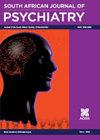Factors associated with long hospitalisation for psychotic disorder patients in an acute ward: Tertiary care hospital
IF 1
4区 医学
Q4 PSYCHIATRY
引用次数: 0
Abstract
Background: The average length of stay is often used to indicate health system efficiency; shorter stays are associated with reduced costs. In South Africa, mental healthcare expenditure is spent on inpatient care.Aim: To identify factors associated with a long stay in an acute psychiatric unit.Setting: A tertiary hospital.Methods: A case-control study review of inpatients diagnosed with psychotic symptoms was used. Sample was divided into two groups, length of stay (LOS) (LOS greater than 21 days, LOS less than 14 days). Total of 82 patients were divided into short stay group (SSG, n = 23) and long stay group (LSG) (n = 59). A comparison of demographic, clinical and system variables was conducted.Results: In demographics, LSG had fewer men compared to SSG (78.3%) and differed statistically from LSG with p = 0.05. Long stay groups were older in comparison to SSG with a p = 0.02. Illicit substance use in LSG was 44.1% and statistically less than SSG (73.91%; p = 0.02). A high proportion of LSG had medical or surgical and psychiatric comorbidities (67.8%) compared to SSG (43.5%) (p = 0.04). A total of 95% patients in SSG had family support.Conclusion: Longer stay was found to be associated with older females with primary psychotic disorders. Comorbidities with less availability of family support were associated with younger males presenting with psychotic symptoms that may be related to illicit substances that respond to rapid stabilisation.Contribution: Active surveillance of medical comorbidities amongst older female patients is necessary for early liaison services to reduce their length of stay.急症病房精神病患者长期住院的相关因素:三级护理医院
背景:平均住院时间通常用来衡量医疗系统的效率;住院时间越短,成本越低。在南非,精神疾病的医疗支出主要用于住院治疗。目的:确定与急性精神病科长期住院相关的因素:环境:一家三级医院:方法:对确诊有精神病症状的住院患者进行病例对照研究。样本按住院时间(LOS)分为两组(LOS大于21天,LOS小于14天)。共有 82 名患者被分为短期住院组(SSG,n = 23)和长期住院组(LSG,n = 59)。对人口统计学、临床和系统变量进行了比较:在人口统计学方面,LSG 组的男性人数少于 SSG 组(78.3%),且在统计学上与 LSG 组存在差异(P = 0.05)。与 SSG 相比,长期住院组的年龄更大,P = 0.02。长期住院组使用非法药物的比例为 44.1%,在统计学上低于长期住院组(73.91%;P = 0.02)。与 SSG(43.5%)相比,LSG 中患有内科、外科和精神科并发症的比例较高(67.8%)(p = 0.04)。SSG中95%的患者有家庭支持:结论:老年女性原发性精神病患者的住院时间较长。合并症和较少家庭支持与出现精神症状的年轻男性有关,这些症状可能与非法药物有关,并对快速稳定病情有反应:贡献:有必要对老年女性患者的合并症进行积极监测,以便及早提供联络服务,缩短住院时间。
本文章由计算机程序翻译,如有差异,请以英文原文为准。
求助全文
约1分钟内获得全文
求助全文
来源期刊
CiteScore
1.60
自引率
10.00%
发文量
56
审稿时长
>12 weeks
期刊介绍:
The journal is the leading psychiatric journal of Africa. It provides open-access scholarly reading for psychiatrists, clinical psychologists and all with an interest in mental health. It carries empirical and conceptual research articles, reviews, editorials, and scientific letters related to psychiatry. It publishes work from various places in the world, and makes special provision for the interests of Africa. It seeks to serve its readership and researchers with the most topical content in psychiatry for clinical practice and academic pursuits, including work in the subspecialty areas of psychiatry.

 求助内容:
求助内容: 应助结果提醒方式:
应助结果提醒方式:


